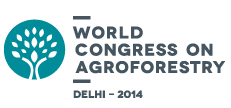Potential of tree plantations for wastewater disposal: Long term use in Eucalyptus
Potential of tree plantations for wastewater disposal: Long term use in Eucalyptus
wca2014-2453 P S Minhas 1,*RK Yadav 2Khajanchi Lal 3 1Director, National Insitute of Abiotic Stress Management, Baramati, Pune, Pune, 2Soils and Agronomy, Central Soil Salinity Research Institute, Karnal, 3WTC, IARI, Delhi, IndiaPopulation growth with increasing urbanization and industrialization is encroaching upon the share of agricultural water and is leading to production of quantities of wastewaters, which are beyond the capacity of natural systems to assimilate. Soils are considered to be the ultimate and probably the most logical sink for these wastewaters. Irrigation of forest species grown for the non-edible products like fuel and timber with wastewater is another approach, which can help in overcoming health hazards associated with sewage farming. Developing the green belts around the cities with forest trees under wastewater irrigation also helps revive the ecological balance and improves environmental. These systems of agro-forestry have come to be known as HRTS (high transpiration rate systems) those promote the treatment of wastewater through renovating capability of living soil filter enabling recycling and reuse of wastewater. Although very tall claims have been made for sewage disposal through plantations but the real estimates on the loading rates of such plantations without the contamination of ground water, show that the annual ET rates increased from 53-140 cm (increment of about 14cm/y) between 2 to 6 years and stabilized thereafter indicating little advantages of trees over crops (rice/maize/cotton-wheat) will occur only after about 5 years of plantations. The values improved considerably with density plantation (96-160 cm/y) but for these to be effective, land requirements would be very high. Thus, there are not much differences in quantities by land disposal and that through forestry plantations but the latter would still result in economic returns in terms of fuelwood production and environmental services. Additional advantage of tree plantations would be harvest of large amount of toxic metals as tree are known to sequester, tolerate and accumulate higher levels of these toxic metals. Adoption of agro-forestry systems further reduce the farmer’s direct contact with and exposure to sewage and carbon sequestration has an additional bonus.

